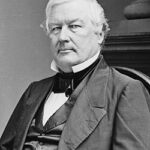The Critical Decision
President Millard Fillmore inherited a nation on the brink of dissolution in 1850. The Mexican-American War had added vast territories to the United States. Congress deadlocked over whether these lands would permit slavery. California sought statehood as a free state, threatening the delicate balance in the Senate. ⚖️ Fillmore championed Henry Clay’s comprehensive package known as the Compromise of 1850.
Key Provisions of the Compromise
The Compromise of 1850 contained five separate bills addressing sectional tensions. California entered as a free state, maintaining the principle of popular sovereignty. The slave trade ended in Washington D.C., though slavery remained legal. Texas received $10 million for surrendering territorial claims to New Mexico. 📊 The Fugitive Slave Act strengthened federal enforcement of slavery laws. Utah and New Mexico territories organized without restrictions on slavery.
Fillmore’s Leadership Role
Unlike his predecessor Zachary Taylor, Fillmore actively supported the compromise measures. He signed each bill into law despite fierce opposition from both sections. ⚠️ His decisive action required significant political courage and statesmanship.
Impact:
Immediate Political Consequences
The Compromise of 1850 temporarily defused the secession crisis threatening the Union. Southern radicals abandoned immediate secession plans after gaining concessions on fugitive slaves. Northern moderates accepted the deal to preserve national unity. 🔥 However, the Fugitive Slave Act sparked fierce resistance in free states. Underground Railroad activity increased dramatically in response to federal enforcement.
Economic and Social Effects
California’s admission as a free state boosted Northern economic power in Congress. The $10 million payment to Texas helped stabilize the state’s finances. 💰 Trade between North and South continued without major disruption. The compromise encouraged westward migration and economic development. However, the Fugitive Slave Act created new tensions in Northern communities.
Long-term Historical Impact
The Compromise of 1850 delayed civil war by approximately ten years. This breathing space allowed the North to develop greater industrial capacity. Railroad construction accelerated during this period of relative peace. 🌍 International observers praised American democratic compromise over armed conflict. However, the compromise ultimately proved temporary, as sectional tensions resumed in the mid-1850s over Kansas-Nebraska Act issues.
